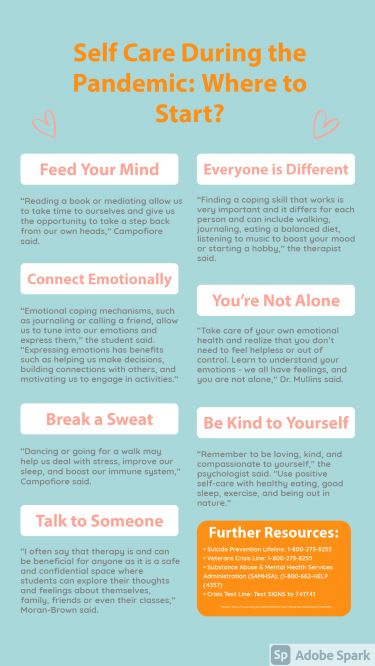By Abby Bittner
The COVID-19 pandemic has created a lot of challenges across the world, but one struggle that has often gone unnoticed has been an increase in mental health issues.
Mental health during the pandemic has impacted many, primarily due to isolation, grief, and depression, among other emotions. Last June, the Centers for Disease Control and Prevention (CDC) found that 40% of adults in the U.S. struggled with mental health or substance use, making self-care a higher priority.
Flagler student Sophia Campofiore serves as president of the National Alliance on Mental Illness (NAMI) organization on campus, which aims to crush the negative stigma surrounding mental health.
In their first gathering during the pandemic, NAMI highlighted how people may feel different, which helped members normalize their emotions.
“This meeting discussed things like how our relationships with others changed, different activities that could be used to help manage boredom, coping mechanisms that may help with these stressful times, and how to manage online classes,” said Campofiore, who is majoring in psychology.
For Campofiore, it helps to focus on the things we can and cannot control to reduce stress.
“For example, I can control how responsible I am during this pandemic such as socially distancing or wearing a mask. However, I can’t control how others behave during the pandemic,” the Flagler senior said. “Having a list of things we can control can help us create a reduced anxiety mindset.”
While the club has seen lower attendance at meetings, other organizations on campus have reached out to NAMI to raise awareness about mental health during the pandemic.
“Mental health has always been an important topic of conversation, but now, maybe more than ever, we need to come together and continue to have these discussions and provide support to those who may need it,” Campofiore said.
Despite the negativity the pandemic has brought, Campofiore sees it as an opportunity to normalize the emotions people have experienced.
“Mental health is equally as important, possibly even more important, as physical health,” she said. “I hope that students will be more comfortable discussing mental health, expressing emotions, and asking for help.”

As a licensed mental health counselor and therapist Rachel Moran-Brown has worked in the Counseling Center at Flagler for seven years. The Counseling Center on campus is offering teletherapy appointments, which has made it more flexible for students to get therapy from anywhere.
Moran-Brown, who has been a therapist for nine years, finds it essential to be mindful of both mental and physical health equally.
“A holistic approach is looking at the mind and body connection and prioritizing care for both. COVID has been incredibly challenging and has exacerbated depressive symptoms and increased anxiety for most people,” she said. “Isolation is detrimental for healthy living.”
Despite seeing a slight decrease in counseling in the fall, the number of students seeking counseling went back up in the spring, which Moran-Brown attributes to the increase in loneliness.
Licensed St. Augustine Psychologist Dr. Janet R. Mullins has used her experiences to aid individuals in many places, from hospitals to institutions. Loneliness and isolation have led to dangerous coping mechanisms, which the psychologist has noticed particularly during the pandemic.
“Recently, we have seen an increase in our country in substance abuse, domestic violence, child abuse, and racism. Thirteen percent of Americans reported starting or increasing substance abuse,” Dr. Mullins said. “People were more isolated and tended to make unhealthy decisions as their stress increased.”
Beyond mental health, Dr. Mullins has seen the pandemic affect other areas of our lives.
“Psychological science has been used this past year to understand and to solve some of the problems we have been facing in this country with the pandemic, racism, misinformation, lack of access to health care for marginalized populations, and other issues,” she said. “As psychologist, we work towards global human rights.”
Despite these difficult times, she hopes people see the pandemic as an opportunity to be more aware of their mental health.
“Learning how to cope during this pandemic with the uncertainty, grief, loss, and stress could be an opportunity to learn positive emotional skills to improve wellness and resilience,” the psychologist said.
Additionally, Dr. Mullins wants the pandemic to bring people together more than drive them apart.
“Since this has impacted people worldwide, I hope that there has been more kindness and compassion towards other people in the world who are different from us, but have experienced the same stressors,” she said.
While the pandemic has brought many negative emotions, Moran-Brown hope it raises awareness for mental health.
“I think we’ve been in a trend the past decade that shows the importance of prioritizing mental health and the pandemic just pushed it even further into the spotlight,” the therapist said. “I hope people feel comfortable asking for help and that they share their experiences with others.


Be the first to comment on "Struggling with Mental Health During the Pandemic, and the Need for Self-Care"